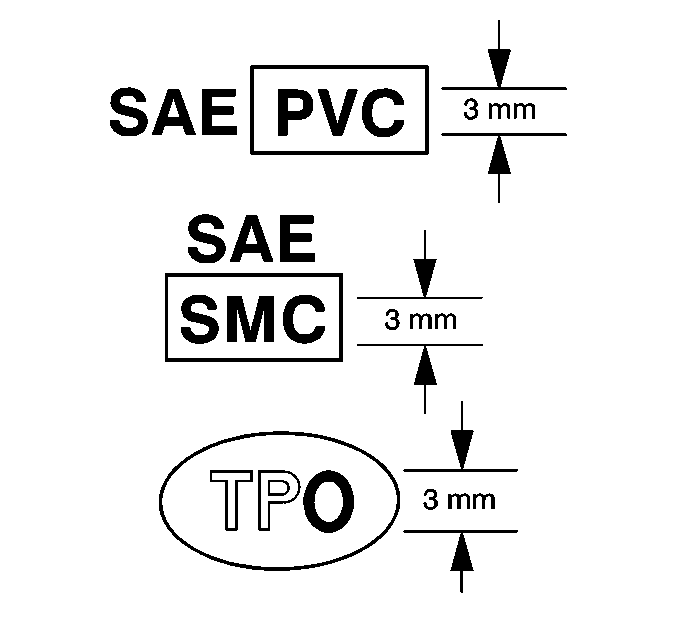
Plastic parts can be identified by the SAE code which is usually found on the rear of the part, and/or by the characteristics of the plastic. Knowing the type of plastic will aid in selecting the proper repair materials and in selecting the proper repair procedure.
Look for the SAE code stamped into the part:
Code Found
- Match the code to those in the plastic identification chart to determine whether the plastic is thermoplastic or thermoset plastic, and whether the plastic is rigid or flexible.
- Identify any special handling procedures.
| • | Examples of flexible plastic parts. |
| - | Thermoplastic (polyphone) TPO, PP, EPDM, etc. |
| - | Thermoset (non-polyolefin) materials: PUR, TPUR, PC, PCT, etc. |
| • | Examples of rigid plastic parts. |
| - | Thermoplastic (polyolefin) TPO, PP, EPDM, etc. |
| - | Thermoset (non-polyolefin) materials: ABS, ABS+PC, PC, PBT, PP, PPE+PA, UP,PPO, PET (Bexloy® 550K), Bexloy® V, PUR (PRIM). etc. |
No Code Found
Important: Do not use a plastic burn test in order to distinguish the types of plastics. The burn test produces vapors that are harmful to you.
Perform one or both of the following tests to determine if the part is thermoplastic (polyolefin) or thermoset (non-polyolefin).
Float Test
- Cut a shaving of plastic from the back of the part. (The shaving should be free of mold release agents and paint).
- Place the shaving in a container of water.
| • | Thermoplastic (polyolefin) will float. |
| • | Thermoset (non-polyolefin) will sink or be submerged. |
Abrasion Test
| • | Sand a spot near the damaged with Grade 36 Roloc Disc. |
| • | Thermoplastic (polyolefin) material melts or frays when sanded. |
| • | Thermoset (non-polyolefin) material sands cleanly. |
Thermoplastic and thermoset plastics can be either rigid or flexible. Thermoplastic plastic parts are best repaired with a hot iron plastic material-feed welder, but are usually replaced. Thermoset plastic can be repaired with epoxy or other more rigid two package repair material.
